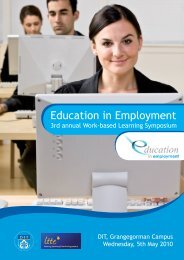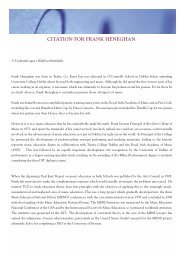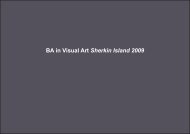TWICE THE SIZE - DIT Update - Dublin Institute of Technology
TWICE THE SIZE - DIT Update - Dublin Institute of Technology
TWICE THE SIZE - DIT Update - Dublin Institute of Technology
Create successful ePaper yourself
Turn your PDF publications into a flip-book with our unique Google optimized e-Paper software.
2 METHODOLOGY<br />
2.1 The Need for a Futures Approach<br />
All that is certain about the future <strong>of</strong> the Irish gateways is that they will change and these<br />
changes will be rapid, vast and unpredictable. In an environment <strong>of</strong> growing complexity,<br />
heightened uncertainty and with a quickening pace <strong>of</strong> change, planners and decision-makers<br />
face a complicated and difficult task <strong>of</strong> preparing for what the future may bring. For some time,<br />
it has been recognised that the prevailing planning approach towards the future is inadequate<br />
and a slow shift towards new ways <strong>of</strong> thinking and acting about the future <strong>of</strong> cities has been<br />
observed. Various criticisms that have been levelled at prevailing planning practice which<br />
include.<br />
Ineffective mechanisms to deal with the complexity and uncertainty <strong>of</strong> urban<br />
environments.<br />
Widespread short-term orientation <strong>of</strong> planning.<br />
Inadequacy <strong>of</strong> the ‘predict and provide’ model, which reinforces the present conditions<br />
and makes it more difficult to consider alternative future options.<br />
Lack <strong>of</strong> a comprehensive integration <strong>of</strong> physical planning with economic and social<br />
development.<br />
Limited collaboration <strong>of</strong> stakeholders from different sectors.<br />
Paucity <strong>of</strong> real community participation.<br />
Failure to provide visionary and innovative solutions.<br />
Being reactive rather than proactive towards the future.<br />
The recognition <strong>of</strong> the failures <strong>of</strong> current planning practice has led to a search for and adoption<br />
<strong>of</strong> new and more imaginative future-oriented approaches. In Ireland, for example, futures<br />
methods have recently been used, in the Border, Midland and Western (BMW) Regional Foresight<br />
exercise and by the Athlone <strong>Institute</strong> <strong>of</strong> <strong>Technology</strong>. Also, over the past few years, The Futures<br />
Academy, <strong>DIT</strong>, has been promoting the use <strong>of</strong> futures methods in the urban and regional<br />
planning field, <strong>of</strong> which this project is the latest instance.<br />
The futures approach used in this study is the ‘Prospective Through Scenarios Process’,<br />
developed by The Futures Academy, <strong>Dublin</strong> <strong>Institute</strong> <strong>of</strong> <strong>Technology</strong>. This process has been based<br />
on concepts and assumptions from a much larger field <strong>of</strong> inquiry - futures studies. Futures<br />
studies is a discipline that aims “to discover or invent, examine and evaluate, and propose<br />
possible, probable and preferable futures” (Bell, 2003). Over the past 40 years or so, futures<br />
studies has developed in both breadth and depth. It is now a globally–distributed meta-discipline<br />
which is taught in a number <strong>of</strong> universities and which increasingly has the capability to<br />
contribute to corporate strategies, policy debates, urban planning, social innovations and the<br />
like. In essence, Futures Studies enables the forward view. That is, it provides interpretative or<br />
propositional knowledge about the future, up-dates this regularly, assesses the quality <strong>of</strong><br />
emerging understandings and uses them for a range <strong>of</strong> socially-useful purposes. The most crucial<br />
27








